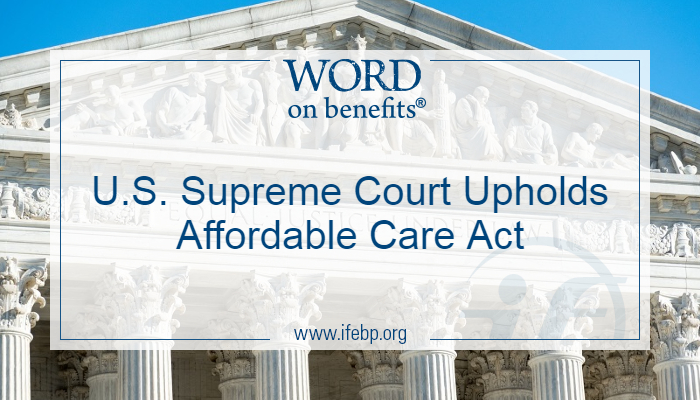
In December 2017, Congress passed the Tax Cuts and Jobs Act, which dropped the Affordable Care Act’s (ACA) individual mandate penalty to $0, effective January 1, 2019. A group of states led by Texas and two private citizens argued that since the individual mandate was essential to the operation of the rest of the ACA, it is not severable and the entire ACA must be struck down as unconstitutional. For additional background, see our previous blog: Your California v. Texas Explainer.
The U.S. Supreme Court (Court) released its opinion today in California v. Texas, ruling 7-2 in favor of upholding the Affordable Care Act.

What was decided?
The Court ruled that Texas and the individual plaintiffs did not have standing to bring the lawsuit challenging the individual mandate because they have not shown a past or future injury from the $0 individual mandate.
- The Court held that the two individuals have not shown that any kind of government action or conduct has caused or will cause the injury they attribute to the minimum essential coverage provision.
- The Court ruled that states have also failed to show that the “challenged minimum essential coverage provision, without any prospect of penalty, will harm them by leading more individuals to enroll in these programs.”
- The plaintiffs have both shown that they do not have standing to attack the ACA’s minimum essential coverage provision as unconstitutional.
The Court reverses the Fifth Circuit’s judgment in respect to standing, vacates the judgment and remands the case with instructions to dismiss.
What does this mean for employers?
The ruling allows the ACA to remain in effect as it exists today.
Employers will need to continue to comply with the ACA employer mandate – Applicable Large Employers (ALEs) with 50 or more full-time employees and full-time equivalents) must offer affordable, Minimum Essential Coverage (MEC) to at least 95% of their full-time workforce (and their dependents). Employers not offering such coverage will continue to be subject to Internal Revenue Code (IRC) Section 4980H penalties.
Developed by International Foundation Information Center staff. This does not constitute legal advice. Please consult your plan professionals for legal advice.
Amanda Wilke, CEBS
Information/Research Specialist at the International Foundation

The latest from Word on Benefits:




